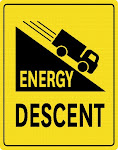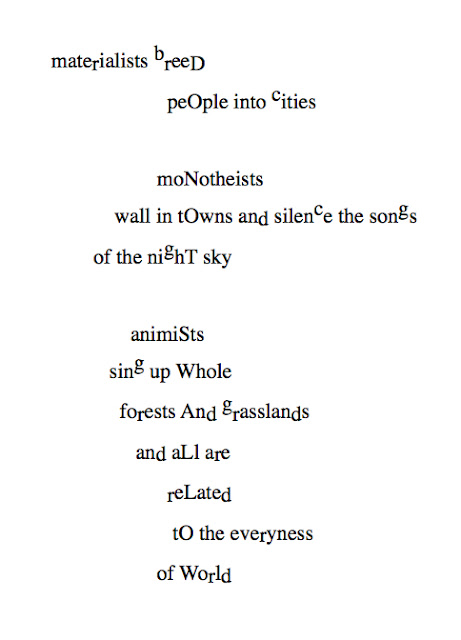Frankly, I wouldn’t like to live in a stupid society where I would have to be all the time engaged in local, communitarian politics, and so on and so on. My idea is to live in a society where some invisible, alienated machinery takes care of things so I can do whatever I want. Watch movies, read and write philosophical books and so on... The problems we are confronting, we can list them in differing ways, but my point is they are all problems of commons. For example, ecology is clearly a problem of commons. Nature or natural environment is our commons, something that shouldn’t be privatised because it belongs to all of us. It is the background, literally the ground of our being. And it’s clear for me here we need to, erh, we need to reinvent, not local democracy but on the contrary, also large-scale solutions. The problem today is not local, not local communitarian democracy, the problem today is how [to] regulate trends worldwide.
While Slavoj Žižek’s idea for communism is sensibly rooted in engagement with a present commons rather than dwelling in the failed communist projects of the twentieth century, his thinking here reveals deep conceits. What commons, who is labouring them, how are global human needs met without negating the call of local human and biotic others?
Žižek expresses himself with an anthropocentric-bourgeois worldview typical of many urban intellectuals –
to live in a society where some invisible, alienated machinery takes care of things so I can do whatever I want. By urban here, I do not mean people who necessarily reside in cities, but rather people who are constructed or crafted by a hyper urbanised world making, or what I’ve called hypertechnocivility – human-centric institutionalism, machine dominance and extreme domestication. Within this limited place for thought there is little listening to the call of biotic others, and few lived examples of a truly shared world. World, to Žižek, must submit to the philosopher’s longings, which for him can be provided by large top-down solutions and alienated, world-destroying distribution systems to bring him his basic needs and comforts – movies and books and so forth.
Žižek’s project could be to speak of the codependency the local and global have with one another, but the local is perhaps too much too close for an ideas man. The 'local' demands relationships and listening much more than blowing ideas. With Žižek, ancestors and nonhumans are of course all relegated to the metropolis’s androgynous dump sites because alienated automation demands such consciousness. Any talk of making returns - regressions, digressions, decays and unmakings – brings scorn and accusations of noble savagery, romanticising indigeneity, pathetic fallacy, the typical attacks from urbane intellectuals on the Left and Right. In Žižek’s alienated city, wholly dependant on extraction and transporting in far away resources, no returns can be made, biophysically or culturally. Everything is a waste stream. Linear progress capitalism (free marketism) and linear progressive urbanism (identity politics) reveal a dim, almost nothing divider between Right and Left, funded by cheap crude oil, rolling out endless footpaths of domestication and monospeciesist thought. Essentially, both advance the global destruction of the planet in their very alienated linearities.
This is why Žižek gets attention. He’s good for the Right, so improbable and incoherent is his philosophy albeit clever and a novelty voice to spar with, and for the intellectual Left a relief there is a counter spokesbeing getting as much attention as Steven Pinker and other apologists for Enlightenment-triggered economic ruination of the biosphere. But really they are the same mens of their generation who lack any abiding care for the relationships required and laboured with within each local ecology. Žižek and Pinker et al are products of selfish-gene ideology, of a carbon-privileged educational training system. Ironically, the mother,
mater, is null and void to such materialists. But declining oil deposits and other significant materials that have made the monster,
Globalman, and which provides such grandiose illusions –
bring me my movies and books, and while you pass the fridge grab me my originless, earth-destroying food – is a momentary affair with ancient sunlight and ancient bird shit. Yes, we’re also at peak phosphate rock, a critical ingredient of alienated agriculture – the brain fodder of hypertechnocivilians, Baby Boomers the first total alpha generation.
There is, however, some place of commune with Žižek in addressing privatised intransigence and exploitation of the biosphere’s innumerable commons. But contrary to Žižek’s boredom with the relational and listened-to local, the only global political project worth considering for the global Left (after it's done with its compulsive obsession with city focussed, carbon-privileged identity divisiveness) is the dismantling of the globalised destruction of local communities and environments. That is the globalised protection of infinite local environments, people and biotic others. If Žižek has a political project that addresses the problem of a systemic eradication of world commons, then there is coherence here. This inevitably must include the degrowth of money and the growth of relational economies, returning to localised gift economies between trusted kin and more formal barter with community others. Money can serve the realm of strangers and enemies, which needs to be no more than 30% of each local economy, which in turn pays for the global culture to protect from violence any local culture. This of course is the dissolution of the banks and debt-based finance.
Until local communities – biotically diverse cultural communities – can make the call on behalf of their local biomes there will never be a proper addressing of species extinction, climate change or resource depletion, never a propper addressing of systemic pollution ideology so required for Žižek’s movies, books and alienated food and energy resources to be trucked to him from someone else’s commons.
The vast global project of local commons protection requires a rebirth of a politically loaded re-indigeneity, especially with regards to how we make economy and how we live with fellow species. This understanding is not possible as hypertechnocivilians. The global Left requires non-urbane voices to be listened to, human and biotic others, to work stridently beyond the frames and limitations of hypertechnocivility. The city universities of the world are generally too narrow in their scope to bare an intelligentsia required to mount the logic and scope of a deeply listened-to global ecosophy stating the protection of local biomes. Economy must return to a loved homeplace, replacing systemic militarised automation with biotic intimacy and the making of returns - gifts. The global project of the Left is to see to it that this is made possible. Everything after this vast project, if fulfilled, becomes a local matter – a return to relationship with each local mother.
Read more...

















